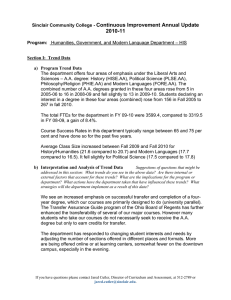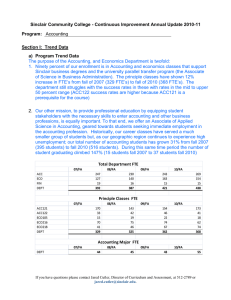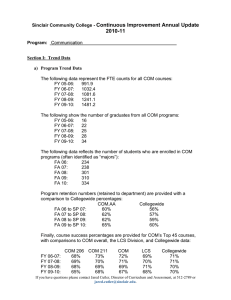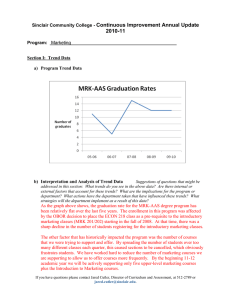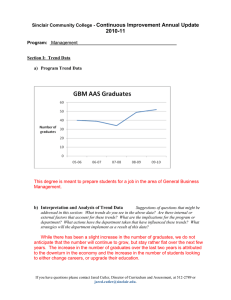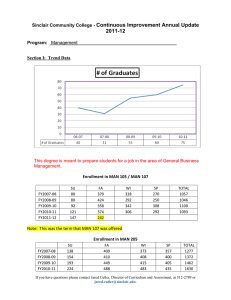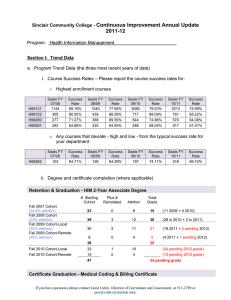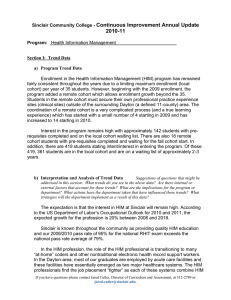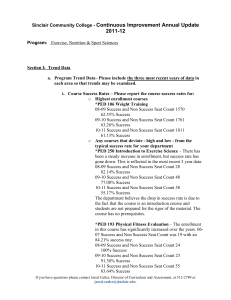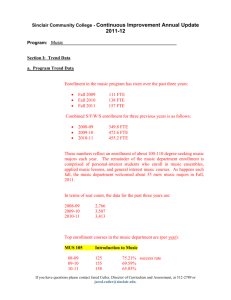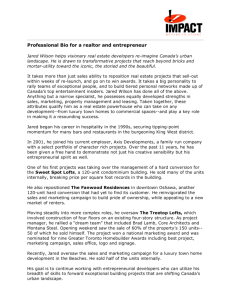Document 15716396
advertisement
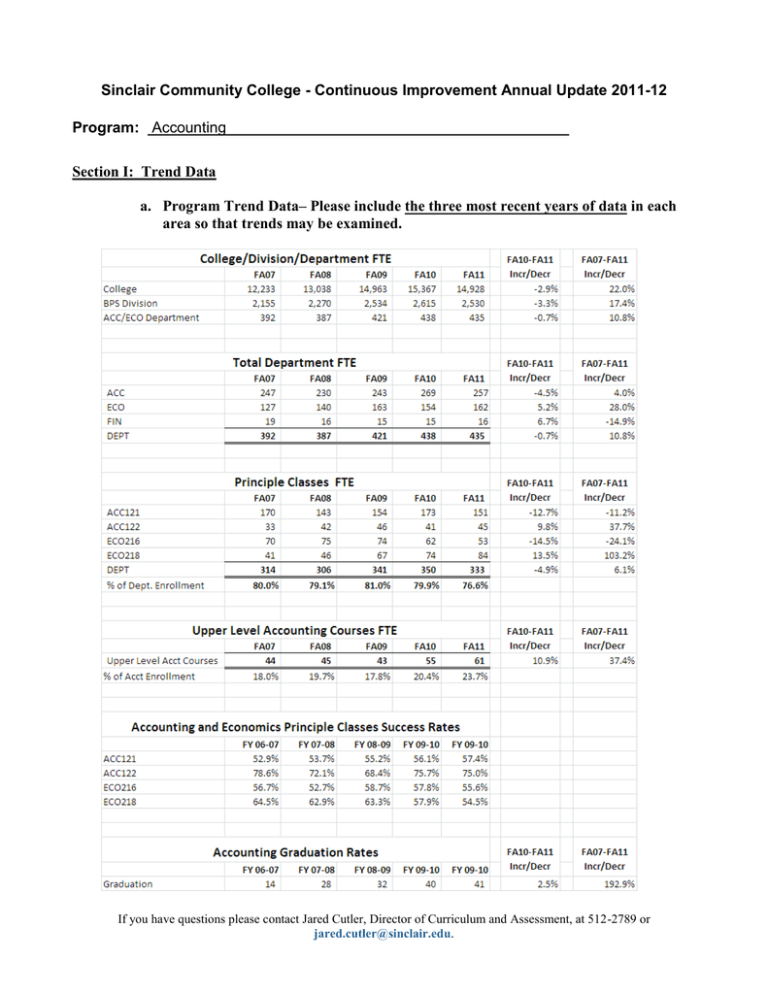
Sinclair Community College - Continuous Improvement Annual Update 2011-12 Program: Accounting Section I: Trend Data a. Program Trend Data– Please include the three most recent years of data in each area so that trends may be examined. If you have questions please contact Jared Cutler, Director of Curriculum and Assessment, at 512-2789 or jared.cutler@sinclair.edu. b. Interpretation and Analysis of Trend Data Included in the Section Above Suggestions of questions that might be addressed in this section: What trends do you see in the above data? Are there internal or external factors that account for these trends? What are the implications for the program or department? What actions have the department taken that have influenced these trends? What strategies will the department implement as a result of this data? Total enrollment for the department increased 10.8% from fall 2007 (392 FTE) to fall 2011 (435 FTE.) This trend is less than what the college and division experienced during the same time period, 22.0% for the college and 17.4% for the division. The last year the college, division and department saw a slight decrease in enrollment with enrollment dropping 2.9% for the college and 3.3% for the division while the department only noticed a 0.7% decline. The reason for the slower drop in enrollment for the department is the increased enrollment of accounting majors (subset of the department) which this last year increased by 10.9%. The purpose of the Accounting and Economics Department is twofold. 1) Provide service classes at the principles level in economics and accounting to support Sinclair business degrees and the university parallel transfer program. 2) Provide professional accounting education by equipping student stakeholders with the necessary skills to enter the accounting profession. 1. Seventy-seven percent of our enrollment for the department is in accounting and economics principle classes that support Sinclair business degrees and the university parallel transfer program, the Associate of Science in Business Administration. Although the principle classes have shown 6.1% increase in FTE’s from fall of 2007 (314 FTE’s) to fall of 2011 (333 FTE’s), there was a decline of 4.9% in the fall of 2011(350 FTE) when compared to fall 2010 (330 FTE). The decrease in fall 2011 principles classes mirrors the decrease in enrollment experienced by the college and BPS Division. The four principle classes ACC121 (introduction to Financial Accounting), ACC122 (Introduction to Managerial Accounting), ECO216 (Principles of Macroeconomics), ECO218 (Principles of Microeconomics) are state TAG (Transfer Assurance Guide) and thus follow the state mandated curriculum. These classes require considerable amount of critical thinking and are very challenging our students. Because of this the department struggles with the success rates in these courses with rates in the mid to upper 50 percent range (ACC122 success rates are higher because ACC121 is a prerequisite for the course). To address the low success rates the following actions have been taken: a) Tested last year and incorporated into all fall 2011 principle economics classes was an online homework and study system, (McGraw-Hill’s Connect and LearnSmart. The online homework gives student instant feedback and allows them to repeat the problem for additional credit. The LearnSmart portion reviews the students comprehension of required reading asking questions in various formats and not letting them proceed until mastery of the subject. We’ll review the impact of this change over the next several quarters. b) For both accounting and economics principle classes we have common course syllabi, assignments, quizzes and exams. Twice a year fulltime faculty and adjuncts meet to review the course and make changes to provide a better learning experience to students. If you have questions please contact Jared Cutler, Director of Curriculum and Assessment, at 512-2789 or jared.cutler@sinclair.edu. Both accounting and principle web courses offer optional exam reviews to help clarify material that that might be a challenge when studying online. 2. Our other mission, to provide professional education by equipping student stakeholders with the necessary skills to enter accounting and other business professions, is equally important. To that end, we offer an Associate of Applied Science in Accounting, geared towards students seeking immediate employment in the accounting profession. Historically, our career classes (upper level accounting classes) have served a much smaller group of students but, as our geographic region continues to experience high unemployment; our total number of accounting students has grown 37.4% from fall 2007 (44 FTE) to fall 2011 (61 FTE). During this same time period the number of student graduating climbed 192% (14 students fall 2007 to 41 students fall 2011) Section II: Progress Since the Most Recent Review a) What was the fiscal year of the most recent Program Review for this program? (The most recent Program Review self-study can be found at http://www.sinclair.edu/about/administrative/vpi/pdreview/ ). 2009 b) Briefly summarize the goals that were listed in Section IV part E of the most recent Program Review Self-Study (this section of the Self-Study asks “What are the department’s/program’s goals and rationale for expanding and improving student learning, including new courses, programs, delivery formats and locations”)? The self-study addressed two issues: 1. Retention and success factors of accounting and economic principle classes. 2. Addressing incorporation of International Financial Accounting Standards (IFRS) into the upper level courses c) What Recommendations for Action were made by the review team to the most recent Program Review? Recommendations for Action It is important that the department develop a more complete understanding of why students are not completing the associate degree and explore strategies to improve acceptance of Sinclair courses by four year institutions. o Answer - The department has not formally studied the reasons for students not completing associates degree in accounting but graduation rates have increased 192.9% since 2007. Investigate the need for developing a certificate program for those students who only want to enroll in particular courses and are not seeking an associate degree. o Answer - The accounting department has revamped its tax certificate to attract a new market. The revised tax certificate rollout coincides with Sinclair’s transition to semesters and the federal government’s requirement for all tax prepares to be licensed by 2013. The new tax certificate is stackable allowing If you have questions please contact Jared Cutler, Director of Curriculum and Assessment, at 512-2789 or jared.cutler@sinclair.edu. student to complete first and then completing two year degree without loss of c will allows student Secure additional high quality internship and coop opportunities for students. o Answer – During the last year the following actions have been taken: We have cultivated a new relationship with small accounting firm, McGraw Timmons. This relationship has yielded 3 internships with two of the internships resulting in FT employment. The department has become more active in Financial Executives International (FEI). As a part of this initiative we are hoping to develop more high quality contacts in the financial field in the Dayton area. Develop means to document direct measures of general education outcomes and program outcomes, and demonstrate how data are being used to improve learning outcomes. o Answer – The department decided to try to track information within our course delivery system, Angel. From there we will expand to other course, rolling up to the degree program. During the year the the following actions have occurred: Met with Alice Renner, Jared Cutler, Keith Knox, and Rex MtCastle to design and capture course assessment within the Angel Course Management System. Course outcomes were loaded into ACC122 Angel shell to track individual student performance. Online quizzes were mapped to course outcomes. Designed and tested instrument to capture offline homework and exam information within Angel. Assess fully the sections taught by adjunct faculty in light of utilization of adjuncts vs. need for additional tenure track faculty, e.g. faculty with auditing experience. Ensure that supporting materials and guidance for adjuncts are well-targeted to the learning outcomes and level of proficiency required by the program. o Answer - All adjuncts are using a common course syllabi, course shells, course exams, course quizzes and course assignments. Accounting adjuncts meet two times during the year to assess effectiveness of common teaching material. Accounting homework and exams have been revised based on adjunct feedback. Use documentation of utilization of services designed to assist students to support the need for an accounting lab. o Answer - During fall 2010 and winter 2011 data was collected to support the need of additional resources for an accounting / economics lab. Based on this information the Accounting and Economics department are testing the use of an open lab that will be available to students starting winter quarter 2012. d) Have the goals in your self-study changed since your last Program Review Self-Study as a result of the Review Team recommendations or for any other reason? If so, please describe the changes. No changes to the department goals since last program review. If you have questions please contact Jared Cutler, Director of Curriculum and Assessment, at 512-2789 or jared.cutler@sinclair.edu. e) What progress has been made toward meeting any of the goals listed in the sections above (b, c, and d) in the past year? Progress updates are listed in sections b and c above. Section III: Assessment of Outcomes The Program Outcomes for this program are listed below. At least one-third of your program outcomes must be assessed as part of this Annual Update, and across the next three years all of these program outcomes must be assessed at least once. Accounting Program Outcomes 1) Mathematical Skills Apply mathematical skills to formulas and solve problems.. 2) Accounting Skills Apply the principles of financial, managerial, cost and tax accounting. 3) General Business Knowledge Describe and apply general business knowledge skills and computer skills.. 4) Human creativity Apply principles of human creativity and its relation to society. In which courses are these program outcomes addressed? MAT116, 122, ACC125 Which of these program outcomes were assessed during the last fiscal year? ASSESSED IN FY 09-10 Assessment Methods Used Simulations ACC201, 202, 203, 211, 212, 221, 222, 235 MAN105, 255 LAW101, 102 FIN215, MRK201 ECO216, 218 ACC121, 122, 240 Arts and Humanities Elective Locally developed exams Simulations ASSESSED IN FY 09-10 5) Effective Communication Demonstrate effective verbal and written communication. ACC125, 240 BIS160, COM211 ENG111, 112, ASSESSED IN FY 10-11 Locally developed exams 6) Analytical Problem Solving Methods Use analytical problem-solving skills.. ACC203, 212, 235, 222, 125 ASSESSED IN FY 10-11 Locally developed exams a) For the assessment methods listed in the table above, what were the results? Effective Communication and Analytical Problem Solving Methods were assessed during the year using a case study from the final exam in ACC125 class. Students were considered successful in meeting the Accounting Program outcome if they received a 70% or better in each perspective assessment area. The charts below are the results of the assessments. Analytical Problem Solving Methods Effective Communication 15% Meets Expectations 85% Does Not Meet Expectations 49% 51% Meets Expectations Does Not Meet Expectations If you have questions please contact Jared Cutler, Director of Curriculum and Assessment, at 512-2789 or jared.cutler@sinclair.edu. Based on the assessment 85% of the students met or exceeded the department’s goal of effective communications as it related to compiling data and putting into a usable format for others to use. Only 51% of the students met the department’s goal of effectively using analytical problem solving methods. b) Were changes planned as a result of the data? If so, what were those changes? No changes are planned as a result of the assessment data collected for effective communication. The results of the analytical problem solving skills were below expectations for the department with only 51% of the students meeting expectations. Upon further review by the department the ACC125 class is the first exposure for students using analytical problem solving methods and may not represent the students that complete our program. The data collected is a good baseline for students entering the program and other classes that follow the ACC125 class such as intermediate account and cost accounting will give students additional practice in analytical problem solving methods. As a result of this data the department will emphasize the importance of analytical problem solving methods in ACC125 along with assessing students in this area in courses that are taken near the completion of the accounting degree. c) How will you determine whether those changes had an impact? The department will continue the data collection for ACC125 and will review the impact of increased emphasis of analytical problem solving methods for the class. The department will collect data and evaluate the results for either intermediate or cost accounting as it pertains to analytical problem solving methods for accounting majors. c) Starting with next year’s Annual Update, this section will ask about assessment of general education outcomes. For FY 2012-13, you will be asked how the department is assessing Oral Communication and Written Communication in your courses, and in addition you will be asked to share the results of those assessments. Please be prepared to address this in next year’s Annual Update. d) Does your department have courses where there are common assignments or exams across all sections of the course? If so, please list those courses, and indicate whether you are currently examining results across all sections of those courses. The department has common syllabi, quizzes, assignments and exams for all accounting and economics principle classes. Meetings are held twice a year with all full-time and adjunct faculty participating. During these meetings assignments, quizzes and exams are review and changed based on student performance and feedback. If you have questions please contact Jared Cutler, Director of Curriculum and Assessment, at 512-2789 or jared.cutler@sinclair.edu. Section IV: Improvement Efforts for the Fiscal Year a) FY 10-11: What other improvement efforts did the department make in FY 10-11? How successful were these efforts? What further efforts need to be made? If your department didn’t make improvement efforts during the fiscal year, discuss the strengths and weaknesses of the department over the last year and how the department plans to address them in the coming year. During the year the following changes were made to Accounting and Economics Department: Based on homework assignment data and confirmed by a student survey weekly assignments for accounting web classes were split into two separate weekly assignments. The intention of splitting the weekly assignments into two separate assignments was to break thing down into more manageable pieces for the students. Data collected from before and after splitting assignments indicates that students that did not do homework once a week did not do homework when split into two smaller assignments. But the change was not done in vain, it turned out that by splitting homework up into smaller pieces help students understand the concepts better and students performed better on exams. The end result was that we had the same number of students that were unsuccessful (students receiving D, F or W) but a higher number of students receiving A’s and B’s instead of C’s. The department tested an online homework system winter and spring quarters 2011 for principles of economics classes. Based on this test the department incorporated the online homework system for all traditional and web economics classes starting fall 2011. During December, fulltime and adjunct economics’ faculty met to review the online homework system results. Based on this meeting, changes were made to enhance student experience with the homework system. Data is being collected to assess the effectiveness of this program to course outcomes. The Accounting / Economics faculty remain active in the college holding key positions in college wide programs and committees. Jeff Vance is currently serving as Vice President/President-Elect of Faculty Senate Rick Andrews is currently serving as Vice President/President-Elect of Department Chairs Council Robert Menafee is part of AQIP (Academic Quality Improvement Process) team and the Completion by Design team. Donna Chadwick continues to serve on the college Health Care Committee, Council of Financial and Economic Advisors, the Online Teaching and Learning Committee and serving as an advisor for Kappa Beta Delta Ribhi Daoud continues to serve on the college Assessment Committee, Division Merit Committee, and the Sabbatical/Mini-Sabbatical committee. b) FY 11-12: What improvement efforts does the department have planned for FY 11-12? How will you know whether you have been successful? The department is piloting the implementation of an Accounting / Economics lab for winter quarter 2012. The college is providing the use of one of the smaller computer labs in building 5 which will be staffed by faculty and student tutors on Wednesdays and Thursdays throughout If you have questions please contact Jared Cutler, Director of Curriculum and Assessment, at 512-2789 or jared.cutler@sinclair.edu. the quarter. A count of the number of students taking advantage of this resource along with student surveys will determine success and feasibility of continuing lab in future quarters. If you have questions please contact Jared Cutler, Director of Curriculum and Assessment, at 512-2789 or jared.cutler@sinclair.edu.
